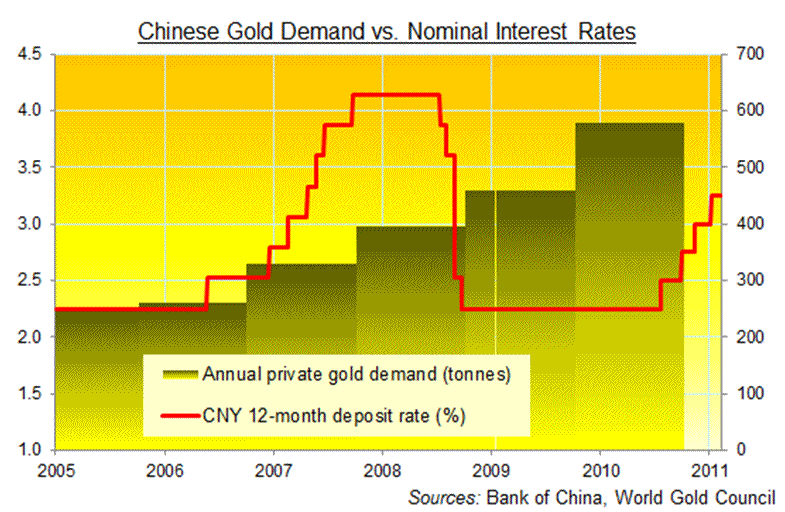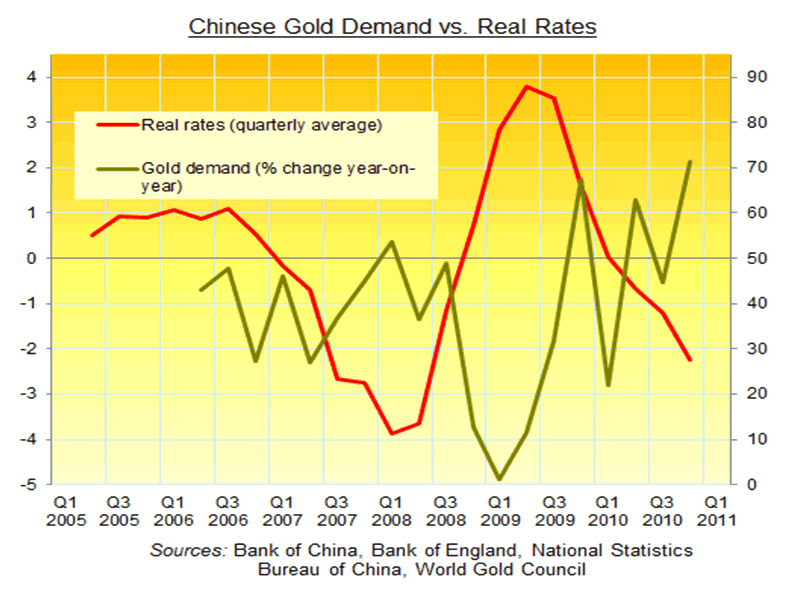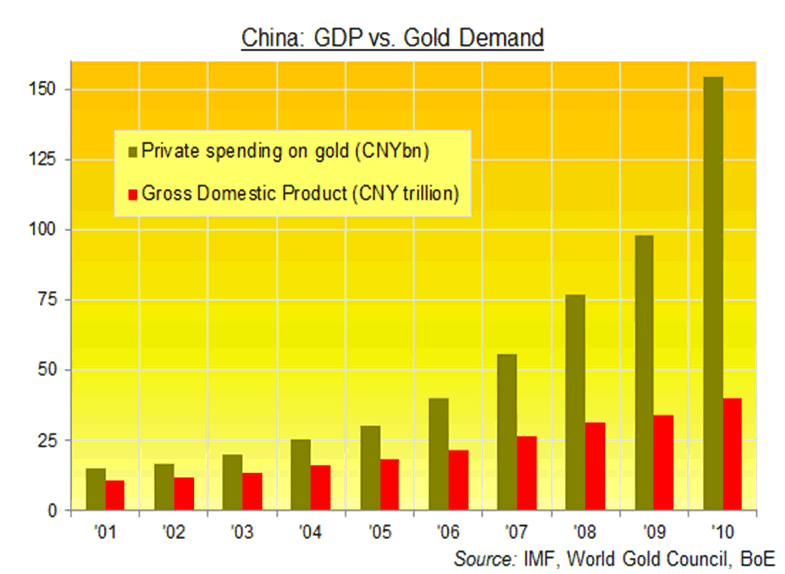China, Gold and Interest Rate Rises
Commodities / Gold and Silver 2011 May 23, 2011 - 03:27 PM GMTBy: Ben_Traynor
 China shows that gold demand need not be a victim of higher interest rates…
China shows that gold demand need not be a victim of higher interest rates…
DOES THE demand for gold automatically fall if interest rates rise?
Other things equal, the answer ought to be yes. Better returns on cash raise the opportunity cost of buying gold, thus dampening demand.
But other things are seldom as equal as they are in economic theory.
Take China, for example. The evidence there suggests that while higher rates certainly have the potential to dent gold demand, inflation and growth are far more important drivers.
China's experience may not be typical, but it's certainly worth examining. China is the world's second biggest gold market after India. The latest World Gold Council data show that China accounted for one quarter of global gold consumption by tonnes in the first three months of 2011.
In fact, gold consumption was 47% up on the same period last year, even though interest rates have risen four times since then. Indeed, if you look at the last five years, Chinese gold consumption has pretty much ignored changes in official interest rates:

Six months ago, as the People's Bank of China (PBoC) began a series of rate hikes, market watchers predicted that Chinese gold demand would fall as a result:
- Higher interest rates would "give gold a decent correction", reckoned Frank McGhee, head dealer at Chicago's Integrated Brokerage Services, last October.
- "When you talk about the interest rate rise, you are talking about a tumble in the gold market," Mike Daly, a senior gold broker, said in November.
- "Fears of further interest rate rises in China [would] have an impact on buying," said Citigroup analyst David Thurtell in the same month.
Since these predictions were made, the PBoC has continued to raise interest rates. And Chinese gold demand – measured as total Yuan expenditure on gold – has shot up...along with the gold price.
This is not to say interest rate policy has no impact at all. If we look at real interest rates – the nominal rate minus inflation – we can see that higher real rates have tended to coincide with slowdowns in gold expenditure:

So what matters is not the nominal rate of return, but the real rate. When real returns are poor – either because the nominal rate is low, or because inflation is high – people tend to buy gold.
Therefore while higher Yuan deposit rates may have a short-term impact on gold demand, if they fail to bring down inflation the effect will be short-lived. And how often does monetary policy do what it says on the box?
Besides, the PBoC is unlikely to opt for really whopping rate hikes. China's president Hu Jintao reportedly once told George W Bush, that what kept him awake at night was how to create 25 million new jobs each year.
The Chinese authorities are terrified that slower growth will cause social unrest. And there are already potential early indicators of a slowdown. China's industrial output growth for the year to April was 13.8%. While this is impressive by western standards, it's a significant drop from March's figure of 14.8%.
You don't foster growth with eye-watering interest rate hikes. The PBoC knows this, which is probably why it has leaned far more on non-interest rate policies in its tussle with inflation.
For example, it has raised commercial banks' reserve requirements – the proportion of customers' deposits they have to hang on to, rather than lend out – five times already this year, in an effort to limit credit growth.
China also showed last week that it is willing to take the direct approach when it comes to curbing price rises. In a move that brought to mind President Nixon's price controls of the early 1970s, the Chinese government fined Unilever for talking publicly about possible price rises.
Along with inflation, the other big driver of Chinese gold demand is economic growth. The country's blistering growth rate means more people can now afford to buy gold, as disposable incomes are higher.
In 2004 Kamal Naqvi, then a precious metals analyst at Barclays Capital, predicted that higher GDP would cause Chinese savers to substitute out of gold:
"Given that China's economic development is likely to continue and the growing global influence of western culture (which tends to be negative for gold), we can expect China's income spend on gold to continue to decline"
To be fair to Mr Naqvi, his analysis was sound, given the data at the time. But his prediction is the exact opposite of what happened:

China's economy has continued to grow, more than doubling since 2004. Over the same period, Chinese spending on gold has gone up by more than 500%.
Yet there remains a sense that the Chinese are still playing catch-up. China only deregulated its gold market in 2001. Compare it with India, which deregulated its gold market in 1990.
India, the only country that buys more gold than China, spent 2.5% of its GDP on gold in 2010. The figure for China, by contrast, was just 0.4% (if Chinese consumption had been at Indian levels, China would have bought just under 3,000 tonnes of gold – or 78% of 2010 global demand).
This figure is small, but it's growing rapidly. In 2009, China spent only 0.3% of GDP on gold, while in 2008 the share was 0.25%. The evidence suggests that as China grows, it buys more gold.
This is counterintuitive for some westerners, who associate higher gold demand with a gloomy economic climate. One explanation is that as China grows richer, more people cross the threshold above which they can afford to buy gold. This implies many other would-be gold buyers could be sitting on the sidelines, not yet wealthy enough to join in.
The bottom line is that gold demand in the world's second largest economy is only marginally driven by interest rates. Economic growth and inflation expectations matter more.
By Ben Traynor
BullionVault.com
Gold price chart, no delay | Buy gold online at live prices
Editor of Gold News, the analysis and investment research site from world-leading gold ownership service BullionVault, Ben Traynor was formerly editor of the Fleet Street Letter, the UK's longest-running investment letter. A Cambridge economics graduate, he is a professional writer and editor with a specialist interest in monetary economics.
(c) BullionVault 2011
Please Note: This article is to inform your thinking, not lead it. Only you can decide the best place for your money, and any decision you make will put your money at risk. Information or data included here may have already been overtaken by events – and must be verified elsewhere – should you choose to act on it.
© 2005-2022 http://www.MarketOracle.co.uk - The Market Oracle is a FREE Daily Financial Markets Analysis & Forecasting online publication.



